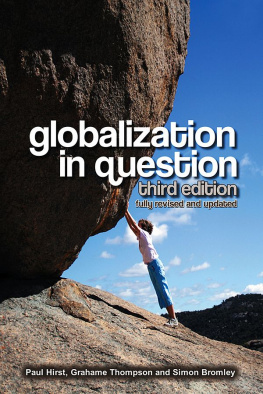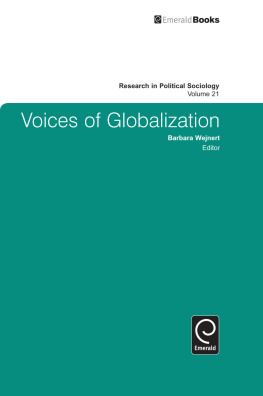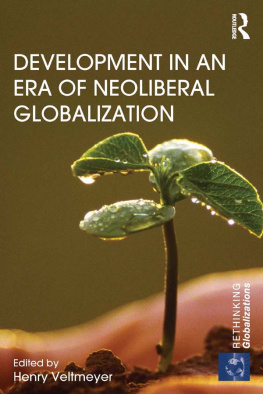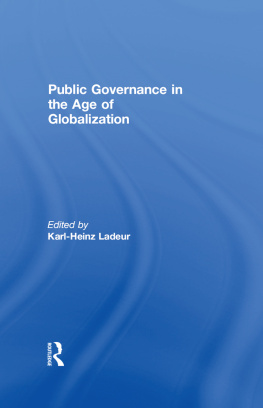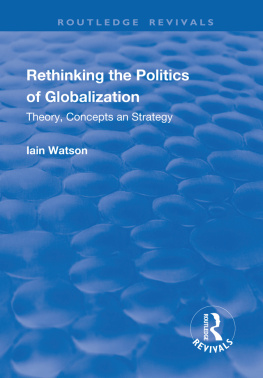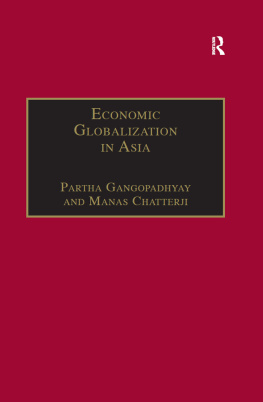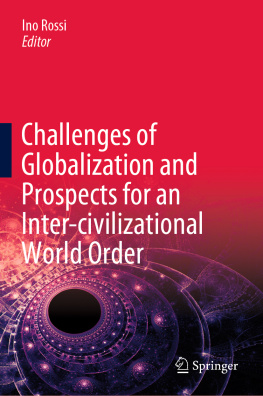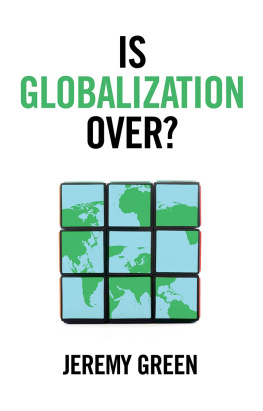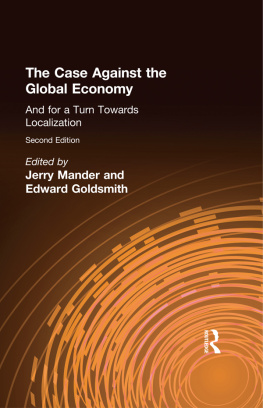To Paul Quinten Hirst: 20 May 194616 June 2003

Copyright Paul Hirst, Grahame Thompson and Simon Bromley 2009
The right of Paul Hirst, Grahame Thompson and Simon Bromley to be identified as Authors of this Work has been asserted in accordance with the UK Copyright, Designs and Patents Act 1988.
First published in 2009 by Polity Press
Polity Press
65 Bridge Street
Cambridge CB2 1UR, UK
Polity Press
350 Main Street
Malden, MA 02148, USA
All rights reserved. Except for the quotation of short passages for the purpose of criticism and review, no part of this publication may be reproduced, stored in a retrieval system, or transmitted, in any form or by any means, electronic, mechanical, photocopying, recording or otherwise, without the prior permission of the publisher.
ISBN-13: 978-0-7456-4151-5
ISBN-13: 978-0-7456-4152-2(pb)
The publisher has used its best endeavours to ensure that the URLs for external websites referred to in this book are correct and active at the time of going to press. However, the publisher has no responsibility for the websites and can make no guarantee that a site will remain live or that the content is or will remain appropriate.
Every effort has been made to trace all copyright holders, but if any have been inadvertently overlooked the publisher will be pleased to include any necessary credits in any subsequent reprint or edition.
For further information on Polity, visit our website: www.politybooks.com
Figures
Tables
Preface
When Paul Hirst and I embarked upon the first edition of Globalization in Question in the mid-1990s we had firmly in our sights the then emerging debate about the end of the national state. Globalization, it was suggested, had fatally undermined the possibility of sensibly deploying the category of the nation-state, since national frontiers were no longer a reality that made sense. Unconstrained market forces and transnational political movements were imposing their own logic on the global system, sweeping away the constraints of national politics and creating a new political and economic order beyond the control of traditional nation-state-centred actors.
As the third edition is published thirteen years later, it is perhaps surprising that this fundamental issue still remains at the heart of the debate over globalization. Paul Hirst and I were designated sceptics in this debate: we wanted to reassert the possibility of continued domestically based regulatory initiatives that could have an impact, and the possibilities of managing the international order that placed the nation-state at the centre of such a multilateral governance system. At its heart, this argument still forms the central one of this new edition, though newly nuanced and updated to take account of events that have often shaken the world since. And this restatement of the argument has been aided by my new writing colleague Simon Bromley, who now becomes the third co-author with this edition. When Paul Hirst died suddenly in June 2003, he and I were then actively planning a third edition. His death interrupted that project and it was put on hold for several years. Needless to say, I was delighted when my work colleague Simon Bromley agreed to become a co-author as the thought of finally generating the third edition re-emerged in early 2007. In our conversations Paul had always been a great champion of Simon: he recognized his sharp intellect and incisive analytical skills. Broadly speaking Simon has concentrated on redrafting the more political chapters dealing with the state capacities and governance issues, while I have concentrated on the historical and more economic ones. This more or less mirrored the original division of labour between Paul and myself.
But we both take collective responsibility for the final product. All chapters have been closely scrutinized for necessary changes and consistency. Most of them have been extensively revised or entirely rewritten, though some more so than others. Chapter 1 lays out the broad thesis of the book and characterizes various senses of globalization that have appeared in the debate. In addition, we have responded to the criticism that our characterization of strong globalization represents a straw man and we have redrafted the contents section. Chapter 2 has been extensively updated and extended. Chapter 3 has been widely pruned, but what remains is more or less as before, though updated. Chapter 4 has been completely revamped and updated. Chapter 5 has been effectively rewritten as a new chapter, while chapter 6 is a completely new addition. Chapter 7 is also a substantially new chapter and chapter 8 has been extensively rewritten to take account of current debates. At the end of chapter 1 the substantive concerns of these chapters are outlined in more detail.
All in all, we think this represents a substantial update of the argument and introduces extensive new empirical material that backs up that argument. The book has always been centrally concerned with providing evidence for its arguments, not just assertions of them, and this approach has been adopted again. Too often wild claims are made about the processes and effects of globalization without these being grounded in adequate empirical justification. Of course, empirical evidence is never neutral and always requires judgement and interpretation, but as a minimum careful generation and scrutiny of evidence is absolutely vital.
This edition was being prepared during a time of some important changes and events in the international system. We are perhaps seeing several developments that are straining against the conception of a stable and truly globalized system. There has been a growth of populist left movements in Latin America that threaten a withdrawal from the full extent of globalizations programmatic embrace. In addition, Russia has begun to reassert its independence from global forces as it takes advantage of high energy prices and increased demand. The idea that China and India are going to bow down and roll over before the full rigours of the global, liberal marketplace is hardly credible. And the USA is taking an increasingly unilateral line on many aspects of global relationship and governance. As far as trade policy is concerned, the apparent collapse of the Doha Round of negotiations puts in doubt the centrality of the WTO and further trade liberalization as an end in itself (rather than as a means to an end).
All this has developed over the past few years alongside a serious disruption of the international financial system with the 2007 credit crunch. This saw essentially national regulatory systems reasserting their traditional roles as guardians of the lender-of-last-resort function to shore up their domestic economies. The credit crunch may also have begun the erosion of exotic financial engineering developments associated with hedge funds, private equity and structured investment vehicles. All of these were argued to have emerged from the liberalized and global financial markets of the 1990s and early 2000s. In their place is developing the next problem for the international financial system: sovereign wealth funds. But these also speak to a potential new phase of investment intentions based upon national interest and state control.
None of this should lead us to expect any sudden undoing of the international system, however. But these developments may delay any further genuine globalization. The global system such that it is has always been at heart an

